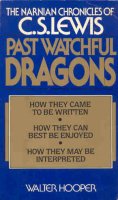 Past Watchful Dragons: The Narnia Chronicles of C. S. Lewis by Walter Hooper (Macmillan, 1971)
Past Watchful Dragons: The Narnia Chronicles of C. S. Lewis by Walter Hooper (Macmillan, 1971)
No other analysis of the Narnia books stands a chance with me now that I've read Planet Narnia. And both books are best read only by those who have already absorbed and fallen in love with the Chronicles. But for such people there is value. I didn't find Past Watchful Dragons nearly as interesting this time as when I first read it—several decades ago, I believe—possibly because through my "C. S. Lewis Restrospective" I've already absorbed much of what Hooper says here, sometimes several times over.
For me, the best part of the book—the reason I recommend it—is Hooper's inclusion in Chapter 5, "Inspiration and Invention," of a long fragment of the only substantial Narnian manuscript that survived Lewis's decluttering fervor. The story never saw publication, though many elements show up in other Narnian tales, most notably The Magician's Nephew. But in this case the boy Digory has a special gift: the ability to talk with animals and trees in our own world—until he tragically loses it. I would really like to have seen what Lewis would have made of that part of the story had it continued. Of course it made me think immediately of my friend Diane, who talks with trees and would probably approve of the reason Digory lost his gift.
Reading it also made me appreciate how much work must go into getting a book from the initial idea to the final version, as this fragment, despite the good story line, sounds amateurish, clearly lacking the beauty and polish of the other tales of Narnia.
I'll end with one of my favorite quotations. I had no idea it was from C. S. Lewis until I found it here, quoted a couple of pages before the story fragment.
There are only two times at which you can stop a thing. One is before everyone is tired of it—and the other is after!
I am not fond of Lewis' theology, but his Space Trilogy and Chronicles of Narnia are excellent literature. I would very much like to read this fragment of which you speak. :D
I do consider 'Til We Have Faces to be one of the best books I've ever had the privilege to read.
Some people communicate very different things through poetry or fiction than they do through prose or exposition.


